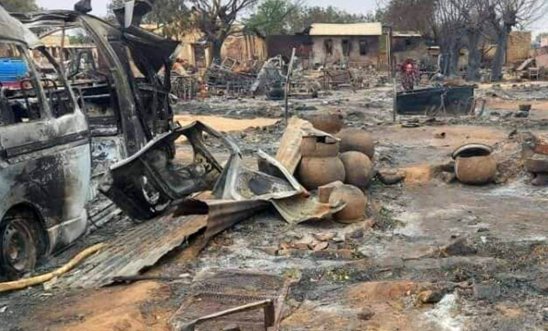
Press releases
Sudan: ‘Horrifying reports’ from El Fasher as RSF attacks civilians

UK-approved arms sales to UAE raise questions of complicity in atrocities
‘All those responsible for the ongoing atrocities must be held individually accountable’ - Tigere Chagutah
In response to reports of violence and Rapid Support Forces (RSF) attacks on civilians in El Fasher, in Sudan’s North Darfur State, Amnesty International’s Director for East and Southern Africa, Tigere Chagutah, said;
“The reports emerging from El Fasher are horrifying. The RSF must immediately end attacks on civilians and civilian infrastructure and allow humanitarian aid into the city. They must also guarantee safe passage for civilians who are trying to flee the violence.
“The people of El Fasher have already endured the RSF’s brutal 18-month long siege of the city. Now is the time for the UN, AU, regional and other international actors to act swiftly to prevent further civilian suffering. All those responsible for the ongoing atrocities must be held individually accountable.
“The RSF has a history of committing massive violations in both Darfur and the rest of Sudan including ethnically targeted attacks against non-Arab communities, deliberate killings of civilians, sexual violence against women and girls, and massacres reminiscent of those that took place in Darfur two decades ago. The international community must act now to prevent the RSF from repeating these atrocities in El Fasher.”
UK-made arms components traced to Sudan conflict
Amnesty has responded to reports that UK military equipment is being used by Rapid Support Forces accused of genocide in Sudan.
Oliver Feeley-Sprague, Amnesty International UK’s Military, Security and Policing Director, said:
“To describe the UK’s arms licensing system as ‘robust’ while UK-made components have been found in weapons used by forces responsible for the widespread killings of civilians in Sudan is frankly indefensible.
“The UK’s own arms trade rules require it to stop the supply of weapons where there is a clear risk those weapons could be diverted to countries under arms embargo or used by end-users to commit or facilitate atrocities.
“The UAE has been a known hub for arms diversion for years and the UK government has long been aware of weapons being routed through the Emirates to conflict zones like Sudan and Libya. Yet the UK kept approving arms sales to the UAE, even when the risks were staring it in the face. This raises serious questions about the UK’s potential complicity in mass atrocities.
“In 2022, the UK government promised to close this loophole by tightening export controls on parts like engines that could end up in military use in prohibited countries. Finding UK-made engines in Sudanese military vehicles shows exactly why those rules were needed and casts serious doubt about whether they’re being properly implemented or enforced.
“The Government must immediately suspend all arms to the UAE. It must also prove that, in light of this evidence, it has launched a full investigation into how this equipment ended up in Sudan, notified the UK company in line with its own enhanced military end-use controls and, taken firm, immediate action to stop this from happening again.”
World’s largest humanitarian crisis
The ongoing conflict in Sudan began in April 2023. It has killed tens of thousands of people and displaced over 12 million, making it the world’s largest humanitarian crisis. The RSF, a paramilitary force that is fighting the Sudan Armed Forces (SAF), has laid siege on El Fasher since May 2024.
On 26 October, the RSF claimed that it had taken control of parts of El Fasher, the last major city in Darfur under SAF control. On 27 October, SAF announced it had withdrawn its forces from the city. El Fasher was home to over 1.5 million people, including hundreds of thousands of internally displaced persons who fled fighting in other parts of Darfur in the early-2000s and from the ongoing conflict. It is estimated that around 260,000 civilians were trapped in the city ahead of the attacks on Sunday.
Amnesty documented war crimes by the RSF and allied Arab militias where they jointly carried out ethnically targeted attacks against the Masalit and other non-Arab communities in West Darfur.